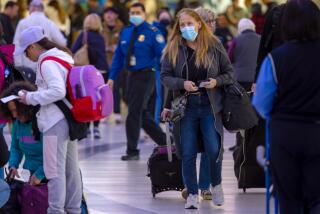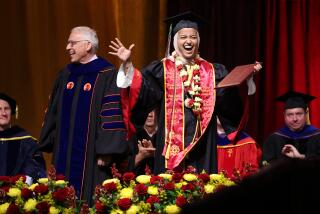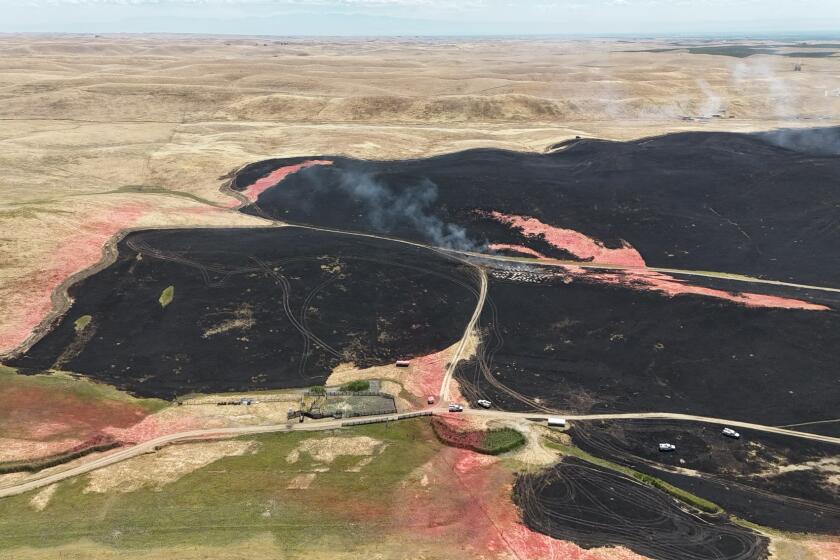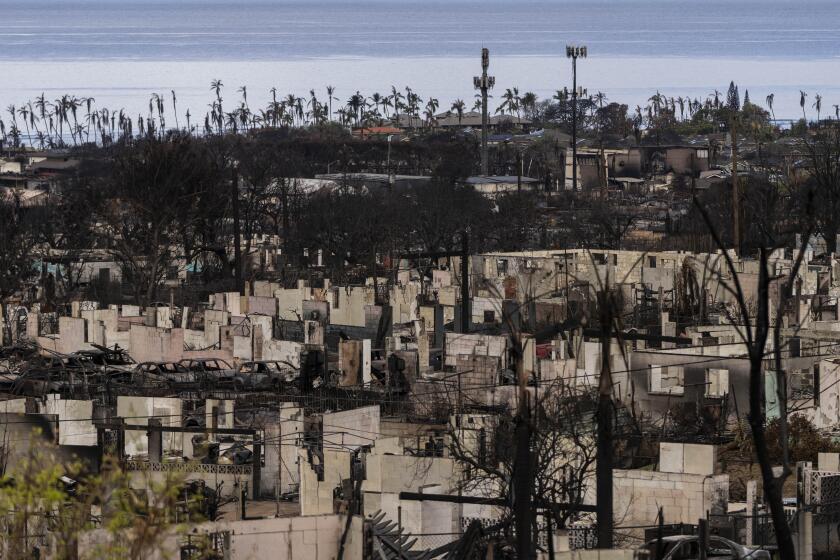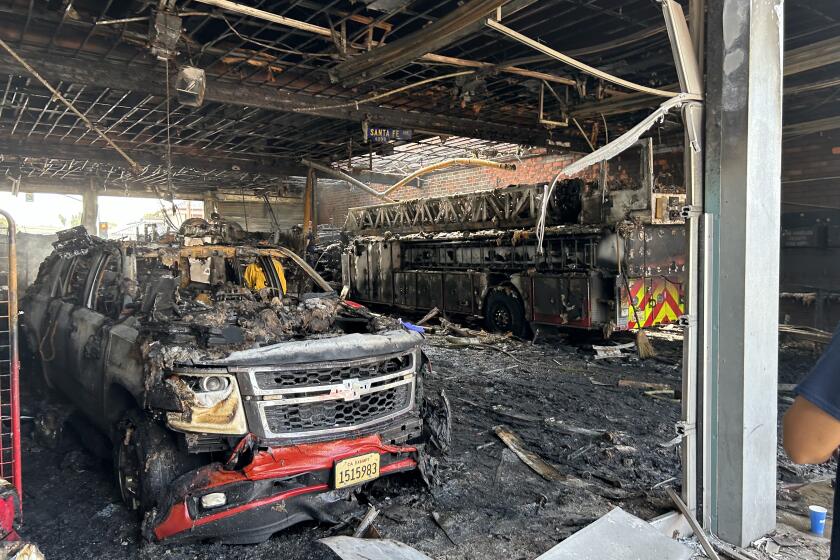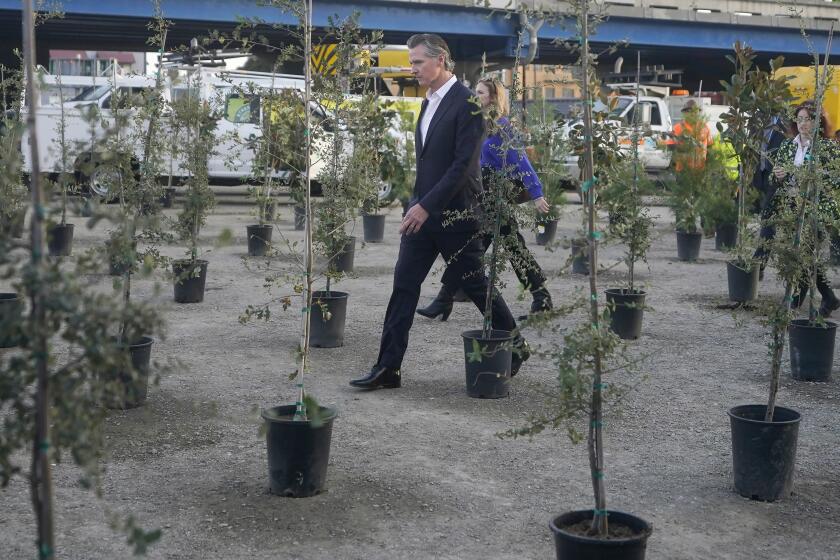Teens Earn a Paycheck the Hard Way
Traversing a steep hillside in Los Padres National Forest, 17-year-old Israel Frias hauls away an overflowing armful of twisted, dried-up manzanita, sumac and ceanothus branches--kindling for a hungry brush fire.
The Santa Paula teenager shoos away yellow jackets and dozens of tiny biting gnats, blinking the sweat out of his eyes as it trickles from under his hard hat.
On this recent Saturday, the U.S. Forest Service is clearing a fire break aimed at saving hundreds of expensive Ojai Valley homes. And Israel is getting a steady, paying job, something he sees as more effective in keeping him out of trouble than any counseling session or intervention program.
That is the idea behind Concerned Resource & Environmental Workers, an Ojai-based nonprofit group rapidly expanding into the region’s poorest, most far-flung areas, where juvenile crime and drug abuse rates are high and access to prevention and treatment services is limited.
“We feel the rural kids are drastically underserved,” director Wally McCall said. “You go into these towns and there’s a Boys & Girls Club and maybe a Y, but that is not going to give kids what they need.”
Program Spreads to Other Communities
About 100 young adults take part each year, with participation highest in the summer. And though 40% of the teens are from the Ojai Valley, where the program originated, participants are increasingly coming from towns such as Santa Paula, Fillmore and Piru.
Many of the young men and women are considered “at-risk,” though only a small percentage has had run-ins with the county’s juvenile justice system and a few work for free as court-ordered community service. Mostly, they are good kids who want jobs, need money and are willing to work hard, McCall said.
That was evident in the hills off Foothill Road above Ojai, where about a dozen kids cleared brush that will be part of a 27-mile network of fuel breaks.
Using firefighting tools, they tore through the prickly brush and piled it high at the bottom of the slope. The branches will be picked up, chipped and used as mulch for landscaping projects throughout Ojai.
“At the end of the first day, I didn’t feel like coming back,” said Christian Orozco, 17, a senior at Santa Paula High School. He plans to use the money he earns--minimum wage of $6.25 an hour--to pay for his senior class trip to Puerta Vallarta.
But the back-breaking nature of the program is also part of its effectiveness, said Jess Lopez, one of the adult supervisors and a drug and alcohol counselor at a treatment center in Camarillo.
Kids tell him about the pressures they face daily in their neighborhoods with alcohol, drugs and gang violence, Lopez said. Working in the program gets them out of that environment--even for only one day--and because the work is tiring, it can deter partying.
“Right now, I could be doing something else,” said Israel, whose experience in the program has inspired him to pursue a career as a firefighter. “Plus, if I get in trouble, I know they could send me here for community service, and I don’t want to do this for free.”
The program began in 1991 and was created by outdoor enthusiasts who wanted to keep Ojai’s vast system of public hiking and equestrian trails maintained. However, it has evolved and grown over the last decade, going from a budget of $92,000 in 1991 to more than $400,000 this year, and from 3,500 work hours 10 years ago to 10,000 this year.
‘It Has Made a World of Difference’
McCall, a former clinical anthropologist, took over in 1999 and since then has sought funding and contracts in the area of fire prevention. The organization gets its money from private donations, grants and cost-sharing agreements with government agencies such as the Forest Service.
The expansion has created more demand.
When McCall decided to open a program in Santa Paula, 60 kids signed up in one lunch hour at the high school. When a school official in Fillmore heard about it, she started a petition to bring the program there, and 850 people signed up.
The program’s next venture will be in Frazier Park, off Interstate 5. There are 470 high school kids in the small mountain town and only a handful of jobs for teenagers.
“I can’t wait,” said Bob Gieniec, vice principal at Frazier Mountain High School. “There’s nothing up here for kids. This would keep them out of trouble, but also let them see what it is to earn an honest wage.”
Norma Perez-Sandford, migrant community liaison at Fillmore High School, said she has witnessed the changes taking place in local kids who have joined the program.
Because they are earning a paycheck that helps their sometimes struggling families, they hold their heads up a little higher, she said. It also gives them a sense of accomplishment that often translates into a better attitude--and better grades.
Parents also rave about it.
“It has made a world of difference in academics, self-esteem and development of a strong work ethic,” said Todd Kelley, member of the organization’s board whose 16-year-old daughter Erin is an employee.
Albert Hernandez, 16, is trying to save up to buy a car. Taking a rest from wielding a fire ax to break a stubborn sumac root, he said he feels lucky to be with the program, even as the hot sun beats down on him and the bugs continue to be relentless.
“It makes me feel satisfied,” said the Fillmore High School junior. “Like, yeah, I did something today. I have a job.”
More to Read
Start your day right
Sign up for Essential California for news, features and recommendations from the L.A. Times and beyond in your inbox six days a week.
You may occasionally receive promotional content from the Los Angeles Times.
